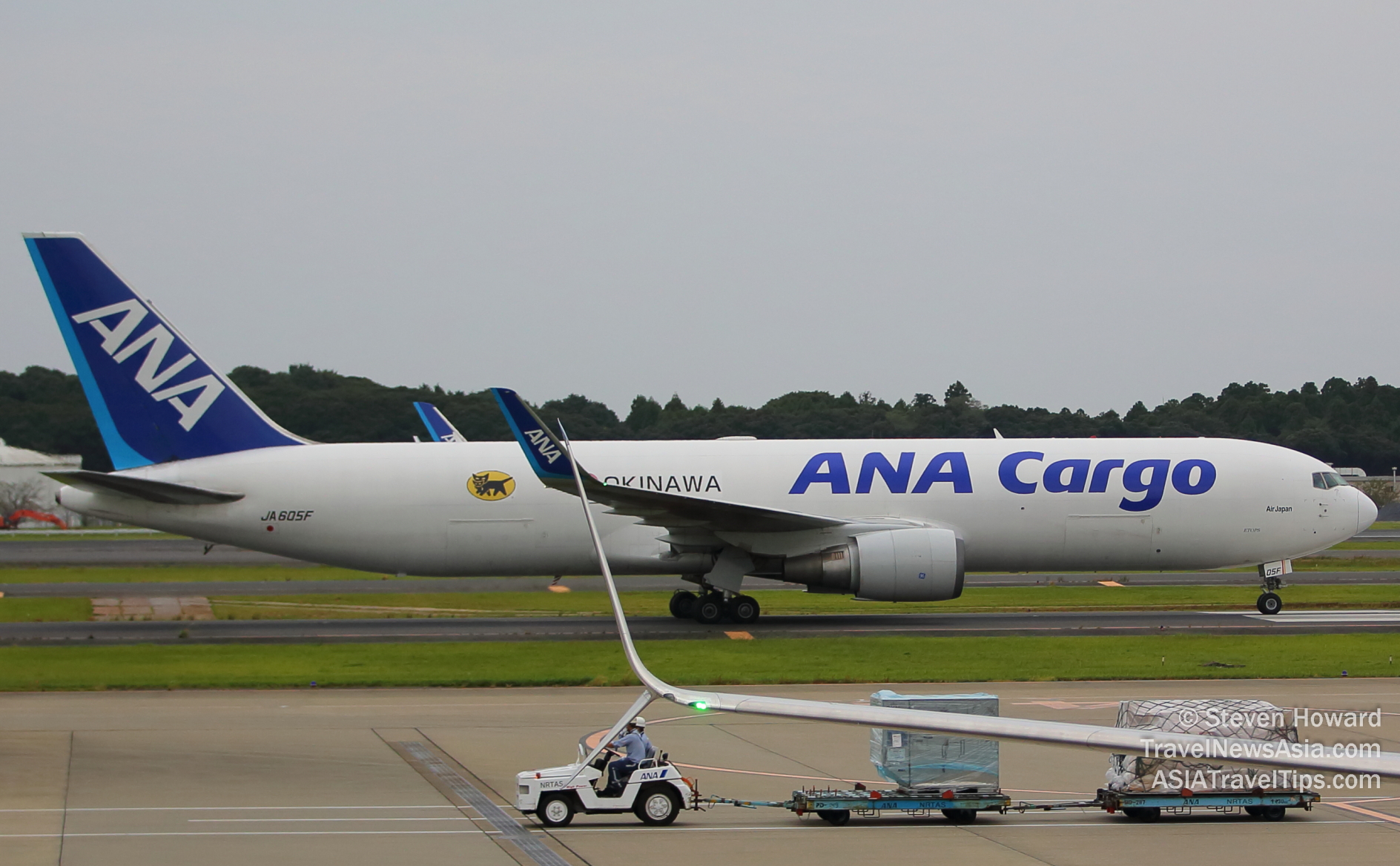|
(08 September 2022, 11:37 +07)
IATA's data for global air cargo markets in July
2022 shows that demand, measured in cargo tonne-kilometers (CTKs),
continued to track at near pre-pandemic levels during the month
(-3.5%), though was 9.7% below July 2021 performance (-10.2% for
international operations).
Capacity was 3.6% above July 2021 (+6.8% for
international operations) but still 7.8% below July 2019 levels.
Several factors in the operating environment
should be noted:
- New export orders, a leading indicator of cargo
demand, decreased in all markets, except China which began a sharp
upward trend in June.
- The war in Ukraine continues to impair cargo
capacity used to serve Europe as several airlines based in Russia
and Ukraine were key cargo players.

ANA Cargo Boeing 767F reg: JA605F. Picture by Steven Howard of TravelNewsAsia.com
- Global goods trade continued to recover in Q2
and the additional easing of COVID19 restrictions in China will
further boost recovery in coming months. While maritime will be
the main beneficiary, air cargo is set to receive a boost.
�Air cargo is tracking at near 2019 levels
although it has taken a step back compared to the extra-ordinary
performance of 2020-2021,� said Willie Walsh, IATA�s Director
General. �Volatility resulting from supply chain constraints and
evolving economic conditions has seen cargo markets essentially
move sideways since April. July data shows us that air cargo
continues to hold its own, but as is the case for almost all
industries, we�ll need to carefully watch both economic and
political developments over the coming months.�
Asia-Pacific airlines saw their air cargo
volumes decrease by 9% in July 2022 compared to the same month in
2021. This was a significant decrease over the 2.1% decline in
June. Airlines in the region continue to be impacted by the
conflict in Ukraine, labor shortages, and lower levels of trade
and manufacturing activity due to Omicron-related restrictions.
The scale of the decrease indicates volatility in volumes, as
pent-up demand from the last Omicron-related lockdowns in China
should prevent such notable declines in volumes. Available
capacity in the region increased by 2.7% compared to July 2021.
North American carriers posted a 5.7% decrease in
cargo volumes in July 2022 compared to the same month in 2021.
This was an improvement over the 13.5% decline in June. The
lifting of restrictions in China is expected to boost demand in
the coming months. Capacity was up 4.2% compared to July 2021.
European carriers saw a 17% decrease in cargo
volumes in July 2022 compared to the same month in 2021. This was
the worst performance of all regions for the third month in a row.
This is attributable to the war in Ukraine. Labor shortages and
lower manufacturing activity in Asia due to Omicron also affected
volumes. Capacity increased 0.9% in July 2022 compared to July
2021.
Middle Eastern carriers experienced a 10.9%
year-on-year decrease in cargo volumes in July 2022. Significant
benefits from traffic being redirected to avoid flying over Russia
failed to materialize and stagnant cargo volumes to/from Europe
impacted the region�s performance. Capacity was up 4.9% compared
to July 2021.
Latin American carriers reported an increase of
9.2% in cargo volumes in July 2022 compared to July 2021. This was
the strongest performance of all regions. Airlines in this region
have shown optimism by introducing new services and capacity, and
in some cases investing in additional aircraft for air cargo in
the coming months. Capacity in July was up 21.4% compared to the
same month in 2021.
African airlines saw cargo volumes decrease by
3.5% in July 2022 compared to July 2021. This was significantly
slower than the growth recorded the previous month (5.7%).
Capacity was 2.2% below July 2021 levels.
Latest
exclusive video interviews: Future of Air Travel -
Interview with Sumesh Patel, President of SITA Asia Pacific; Miss
International Queen 2024 (MIQ 2024) - Interview with Alisa
Phanthusak, MD, Tiffany's Show Pattaya, Thailand; 16
HD Video Interviews from Routes Europe 2024 in Aarhus, Denmark;
9 HD Video Interviews from Routes Asia 2024 in Langkawi, Malaysia;
Standard to Open Residences in Hua Hin and Phuket, Thailand; Video
Interview with Amar Lalvani, Executive Chairman;
9 Exclusive Video Interviews
from ASEAN Tourism Forum
2024
in Vientiane, Laos;
8 NTO Press Conferences from ASEAN Tourism Forum 2024 in
Vientiane, Laos;
13 HD Video Interviews from World Travel
Market 2023 in London, England;
5 HD Video Interviews from APG World Connect 2023 in Monaco, France;
and
15 HD Video Interviews from Routes World 2023 in Istanbul, Türkiye.
|
Headlines: |
|
|
